This is a beautifully presented hardback with almost 500 pages and over 700 recipes. Each recipe is illustrated, has clear instructions and a nutritional analysis. The book has six main sections
- babies and toddlers
- family meals
- easy entertaining
- food to go
- baking
- cooking with kids.
Each section is divided into subsections which are clearly marked at the top of the page, for example, family meals has fish, poultry, meat and many others. There are feature pages about different topics such as fussy eaters, unexpected visitors and using leftovers-all real practical stuff.
However, the only real way to test a recipe book is to cook so we've been trying this out-not all 700+ recipes but a selection.
The day the book arrived, we had some chicken left over from a roast. This went into mild chicken curry which was successful even with our fussy eaters.
Birthday season was upon us so we decided to test out the chocolate cake. The unpleasantly named devil's food cake turned out to be a delicious, moist cake.
This recipe is definitely a keeper! We also made the chocolate fudge cake which again was a yummy moist cake and went fast at our home education group meeting. Of the two recipes, I prefer the devil's food cake but both are worth repeating.
This recipe is definitely a keeper! We also made the chocolate fudge cake which again was a yummy moist cake and went fast at our home education group meeting. Of the two recipes, I prefer the devil's food cake but both are worth repeating.
The blueberry ripple cheesecake looked delicious but disappeared at a "bring and share" before I could try any: a reason to make this again!
We go through seasons when we eat loads of bananas and then for no apparent reason no one eats them and there is a glut. This was a time when everyone had given up on bananas. The excess were saved from waste by the tasty banana cake and the unusual, and really quite healthy banana icecream.
We ate the French onion soup and the chicken and bean stew. This again, needs to be made again.
Perhaps best of all was rosemary focaccia straight from the oven-yum!
So what did we think? The recipes have been a success. The pictures have meant that the children have spent ages looking at the book and making plans about what to cook.
I found the instructions clear and the results reliable. There are some particularly helpful ideas in the features section, particularly, around unexpected guests and leftovers.
My only criticism is that more recipes could be a little more flexible, for example, the chocolate cake recipes say that an electric whisk is needed but could say that a wooden spoon and elbow grease are an alternative!
My only criticism is that more recipes could be a little more flexible, for example, the chocolate cake recipes say that an electric whisk is needed but could say that a wooden spoon and elbow grease are an alternative!
This is a recipe book that will be used again and again. There are certainly more recipes that I want to try. Definitely recommended!
The Family Kitchen Cookbook is available from DK at £25.
I received the Family Kitchen Cookbook from DK in exchange for my honest review. I was not required to write a positive review nor was I compensated in any other way. The opinions are all my own and those of my family.





































